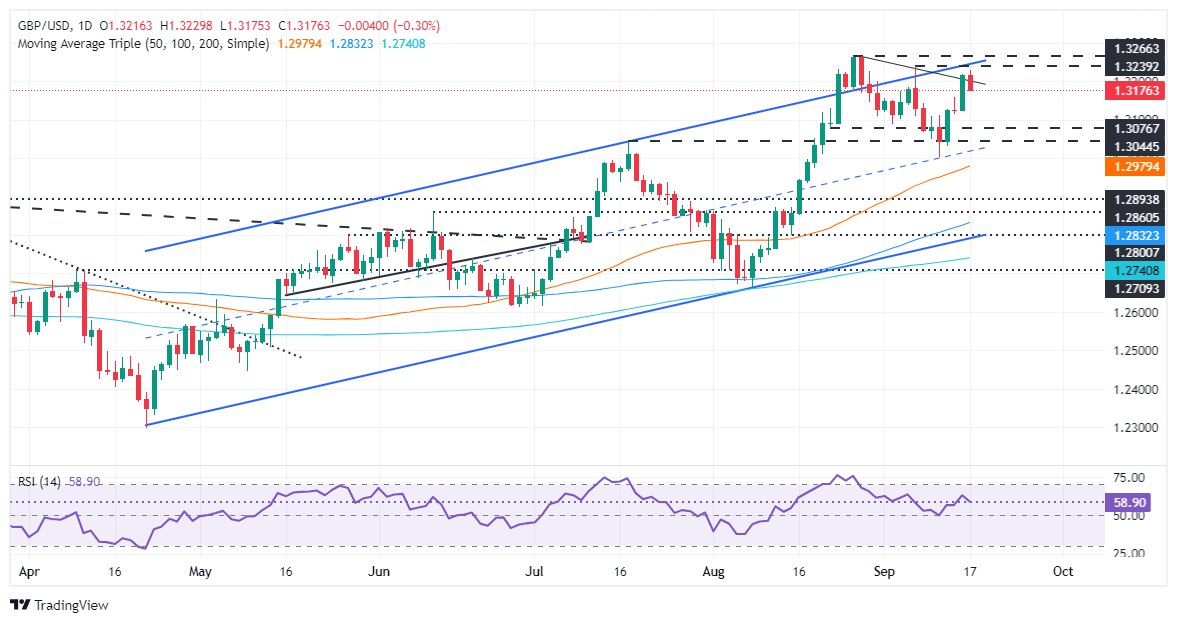GBP/USD Price Forecast: Retreats below 1.3200 on strong US data
- GBP/USD remains upward biased, but short-term momentum has shifted bearish after dipping below 1.3200.
- Key support lies at 1.3146, with further downside targets at 1.3100 and the recent low of 1.3001.
- On a rebound, resistance levels include 1.3200, the YTD high of 1.3266, and the March 22 peak at 1.3298.
The British Pound erased its earlier gains and dropped below 1.3200 against the Greenback after the US Census Bureau reported stronger-than-expected US Retail Sales. Even though the data didn’t change expectations for a 50-basis points (bps) Fed rate cut, the GBP/USD posted losses of over 0.20% and exchanged hands at 1.3186.
GBP/USD Price Forecast: Technical outlook
The GBP/USD is upward biased even though the pair fell below 1.3200 following US Retail Sales data. Momentum shifted slightly bearishly in the short term, but the Relative Strength Index (RSI) suggests that buyers are in charge and that the dips should be bought.
If the market continues to fall, the GBP/USD's first support would be the September 15 low of 1.3146. Once cleared, the next stop would be 1.3100, followed by the latest swing low at 1.3001.
On further strength, the GBP/USD first resistance would be 1.3200, followed by the year-to-date (YTD) high at 1.3266, ahead of the March 22, 2023 peak at 1.3298.
GBP/USD Price Action – Daily Chart
Pound Sterling FAQs
The Pound Sterling (GBP) is the oldest currency in the world (886 AD) and the official currency of the United Kingdom. It is the fourth most traded unit for foreign exchange (FX) in the world, accounting for 12% of all transactions, averaging $630 billion a day, according to 2022 data. Its key trading pairs are GBP/USD, aka ‘Cable’, which accounts for 11% of FX, GBP/JPY, or the ‘Dragon’ as it is known by traders (3%), and EUR/GBP (2%). The Pound Sterling is issued by the Bank of England (BoE).
The single most important factor influencing the value of the Pound Sterling is monetary policy decided by the Bank of England. The BoE bases its decisions on whether it has achieved its primary goal of “price stability” – a steady inflation rate of around 2%. Its primary tool for achieving this is the adjustment of interest rates. When inflation is too high, the BoE will try to rein it in by raising interest rates, making it more expensive for people and businesses to access credit. This is generally positive for GBP, as higher interest rates make the UK a more attractive place for global investors to park their money. When inflation falls too low it is a sign economic growth is slowing. In this scenario, the BoE will consider lowering interest rates to cheapen credit so businesses will borrow more to invest in growth-generating projects.
Data releases gauge the health of the economy and can impact the value of the Pound Sterling. Indicators such as GDP, Manufacturing and Services PMIs, and employment can all influence the direction of the GBP. A strong economy is good for Sterling. Not only does it attract more foreign investment but it may encourage the BoE to put up interest rates, which will directly strengthen GBP. Otherwise, if economic data is weak, the Pound Sterling is likely to fall.
Another significant data release for the Pound Sterling is the Trade Balance. This indicator measures the difference between what a country earns from its exports and what it spends on imports over a given period. If a country produces highly sought-after exports, its currency will benefit purely from the extra demand created from foreign buyers seeking to purchase these goods. Therefore, a positive net Trade Balance strengthens a currency and vice versa for a negative balance.

